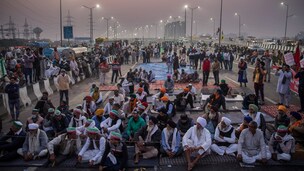New coronavirus variant: Check how it has affected India, and what are the new rules
A surge in the infection rate caused by the new variant of the coronavirus has led to millions entering a stringent new stay-at-home lockdown in the UK.
December 21, 2020 / 07:50 PM IST
With a new strain of coronavirus being identified in the United Kingdom and, consequently, in other countries in the world, a new set of rules and fresh lockdowns have come into effect.
A surge in the infection rate caused by the new variant of the coronavirus has led to millions entering a stringent new stay-at-home lockdown in the UK from Sunday, with non-essential shops and businesses now closed.
Read: New coronavirus strain in the UK: Scientists’ concerns and what we know so far
Let's take a look at how this has been panning out in India.
>> The government on December 21 announced suspension of all flights originating from the UK to India until December 31, in view of the rising spread of the new coronavirus strain there.
>> Keeping in view the new strain, and how fast it infects, the Maharashtra government on December 21 announced night curfew in Mumbai and other major cities of the state.
Follow new coronavirus strain live updates on Moneycontrol
>> Additionally, the Maharashtra government also decided to conduct institutional quarantine for 14 days for passengers arriving from European and Middle Eastern countries.
>> Passengers from European and Middle Eastern countries will be tested for the virus on the fifth or seventh day after quarantine. They will be released home after completing their quarantine period.
Explained: Why the UK’s mutated coronavirus strain may not be an immediate threat to vaccines
>> The state government has also decided to home quarantine those who are landing in Mumbai from other countries.
>> Maharashtra Chief Minister Uddhav Thackeray has directed officials to set up a separate hospital for passengers from Europe if they have symptoms of the new virus.










_2020091018165303jzv.jpg)


























